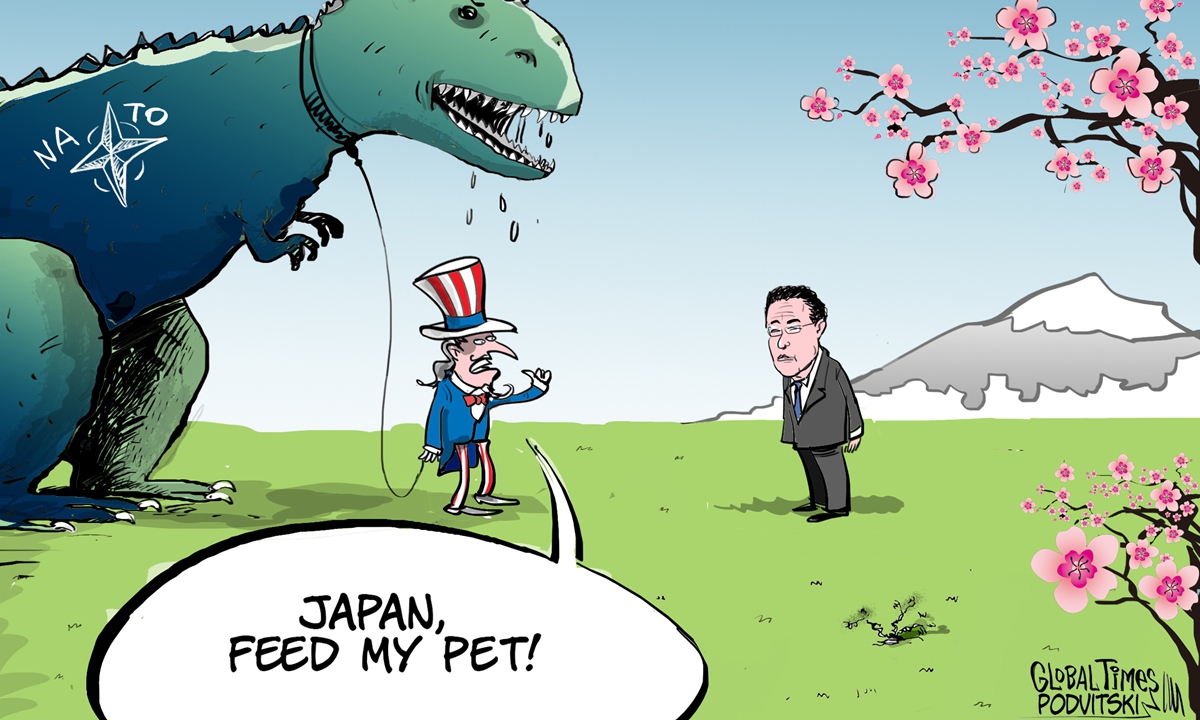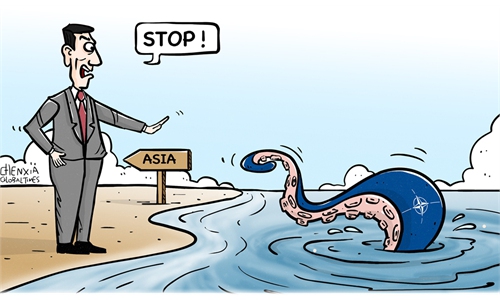
Cartoon: Vitaly Podvitski
At the upcoming NATO summit in Vilnius, although the main focus of the international community will be the Ukraine issue, the Japan factor cannot be ignored.In recent years, high-level interactions between Japan and NATO have been frequent, and the cooperation between the two sides has become increasingly institutionalized and normalized. Last month, Japan's Air Self-Defense Force sent a transport aircraft to the two-week Air Defender 23 drills, marking its latest step in breaking the postwar military policy.
There are two trends that relate to Japan during the Vilnius NATO summit. The first is the progress on NATO's planned liaison office in Tokyo. The move, once realized, not only means that the relationship between NATO and Japan is accelerating toward a "quasi-alliance," but it also signals that NATO takes a substantial step in expanding to the Asia-Pacific region. According to Nikkei, NATO is poised to defer its decision on establishing the liaison office in Tokyo until autumn or later due to opposition from some member states. But the possibility of giving a green light to it is not completely ruled out.
From NATO's global strategic goal, the functional scope of the liaison office in Tokyo will not be limited to Japan, but will extend to the entire Indo-Pacific region. NATO aims to strengthen its connections with US allies in the Asia-Pacific region through Japan, including enhancing security cooperation with countries such as South Korea, Australia, New Zealand and the Philippines. This will be a landmark move for the US to connect transatlantic partnerships and the Asia-Pacific alliance system.
It means that in the future, NATO could engage in Asia-Pacific security affairs in a more convenient manner. Therefore, whether the liaison office in Tokyo can be established eventually will become an important indicator for observing the progress of NATO's expansion to the Asia-Pacific.
Second, it remains to be seen if military cooperation between Japan and NATO will be upgraded. According to the Nikkei, NATO and Japan have concluded negotiations on new areas of cooperation and are preparing to announce it at the Vilnius summit. "The Individually Tailored Partnership Program (ITPP) consists of 16 cooperation areas with three strategic goals: to strengthen dialogue, enhance interoperability and bolster resilience," Nikkei Asia reported.
According to the report, one of the cooperation areas is for NATO forces and Japan's Self-Defense Forces to improve military capability and interoperability. The document will say that Japan and NATO will "effectively cooperate in the area of capability and interoperability development, as well as standardization."
Whether it is NATO's establishment of a liaison office in Tokyo or the development of quasi-alliance between NATO and Japan, it indicates that the processes of NATO's NATO's expansion to the Asia-Pacific or the NATO-ization of the Asia-Pacific are accelerating and Japan plays a crucial role in them. When the massive Cold War military bloc and a resurgent Japan on the path of military expansion extend their influence into the Asia-Pacific, there is a reason to be concerned about the region facing more severe instability and risks of confrontation.
Although the world is focused on how the Vilnius Summit will respond to the Ukrainian crisis, we shouldn't ignore the threat posed by Japan's participation in the summit. Whether it is NATO's claim that "the security of Europe and of the Indo-Pacific is inseparable" or Japan's absurd assertion that "Ukraine today could be East Asia tomorrow," they are nothing more than excuses for the US and the West to promote a "new Cold War" confrontation in the Asia-Pacific region, with the ultimate goal of maintaining American unipolar hegemony.
NATO's involvement in security affairs in the Asia-Pacific region and Japan's introduction of external forces to provoke regional conflicts have seriously worsened the atmosphere of unity and cooperation among Asia-Pacific countries. If permitted to develop, this could push the region towards division and conflict. In the long term, this will not make NATO and Japan more secure but make them bear the heavy strategic burden. Macron's "strategic awakening" hopes to sound the alarm for NATO countries and urge NATO to rein in its actions. Japan, which has deviated from the path of peaceful development, needs to recognize that sliding towards a turbulent and divided Asia-Pacific will not make it stronger but only deepen its own security dilemmas and development challenges.
The author is a research fellow at the China Institute of International Studies. opinion@globaltimes.com.cn

